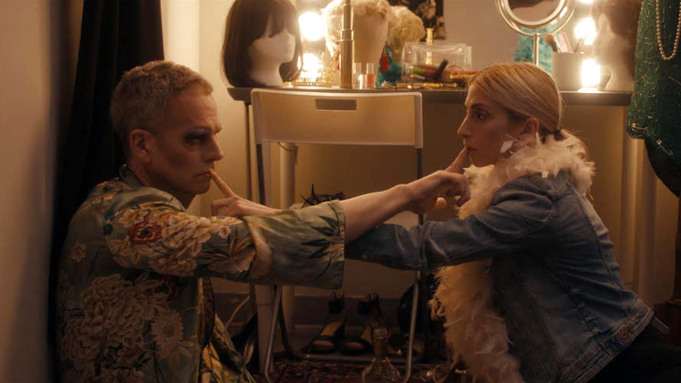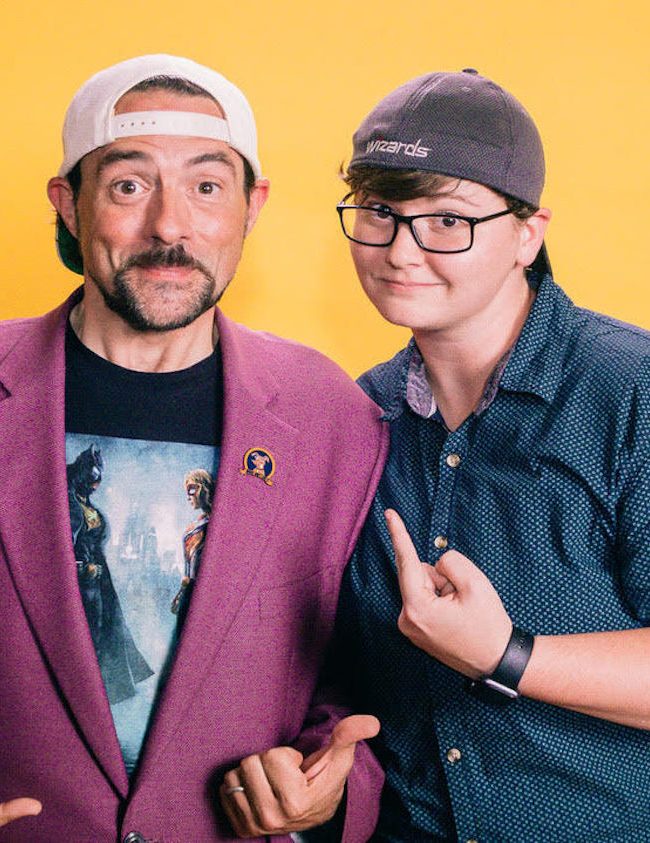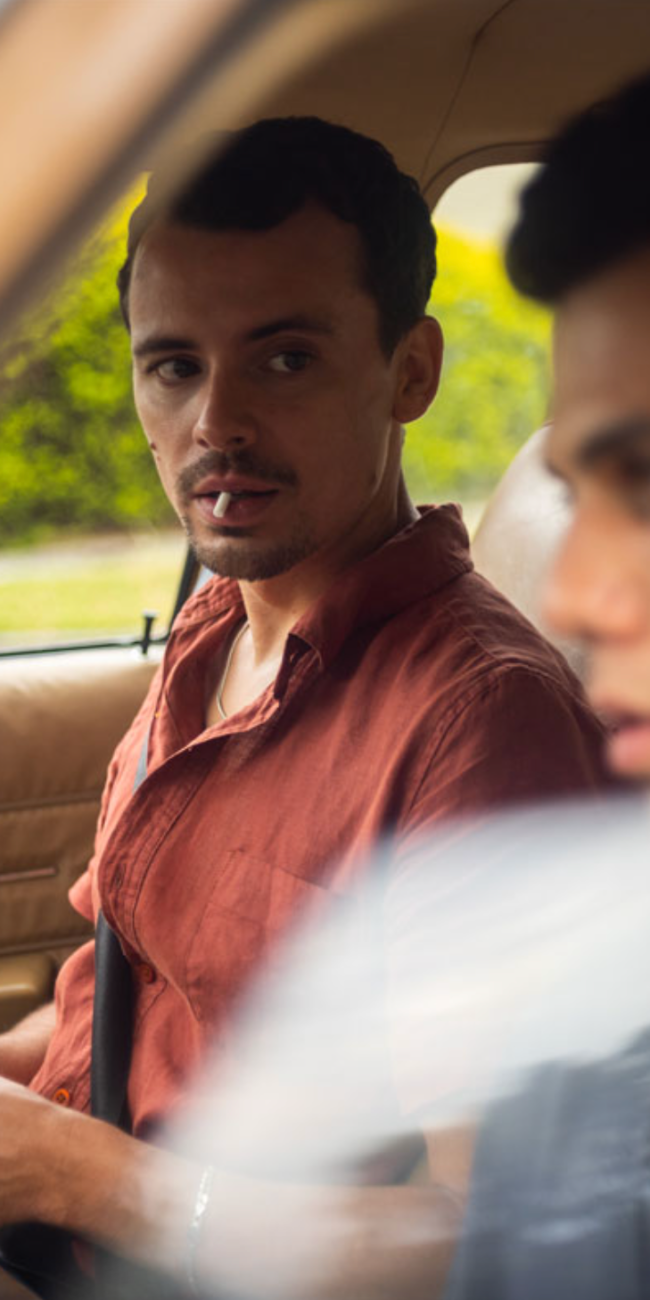A Conversation with Morgan Ingari, Candice Kuwahara & Molly Bernard (MILKWATER)

Surrounded at her friend’s baby shower by picture-perfect girls living picture-perfect lives, Milo (Molly Bernard) wants to do more. She wants to stand for something, be a part of something, do good, anything just establish herself as something other than the inane people around her. She stumbles instantly on her opportunity when she meets Roger (Patrick Breen), an older gay man who has been trying unsuccessfully to have a child for years. Impulsively, Milo offers herself up to be his surrogate.
Last fall, while Milkwater was making the festival circuit, I had the opportunity to interview Writer-director, Morgan Ingari, producer, Candice Kuwahara, and actress, Molly Bernard, who admittedly, given her role on the amazing television show Younger, I was a wee bit star struck by.
Hammer to Nail: This film does such a great job of tiptoeing on either side of comedy and drama. It must’ve been very difficult to make sure you were hitting the right emotion for the right scene and to not go too far one way or another, because there’s times in this film when we don’t quite like Molly’s character. She doesn’t come out to be the greatest person all the time.
Morgan Ingari: Yeah. Yeah, no, I mean, I think that was…Thankfully, Molly and I got to have some rehearsal time before we shot and she had done so much homework in marking out the beats of where were the jokes, where is there less levity, and I mean, I think her chops as a comedic actress, the movie would have been completely impossible without them because we really need to buy this wild vacillation between earnestness and jokes that are played as jokes, so rehearsal was so helpful… Because the scenes are long, I think that was the hardest part in terms of the tone between comedy and drama was these long, long takes and a lot of choreography and making sure that we were nailing those beats.
HtN: Molly, how did you feel in the moment, trying to hit the points of this character and playing someone who starts off with the best of intentions and ends up in pretty dark place?
Molly Bernard: I guess without sounding pretentious in any way, but in my graduate school training, in Shakespeare, we were taught that any great script is a map that it is your responsibility to follow, and to that end, essentially, if you get on it, if you get on that train and follow the track that it’s on and don’t try too much to make it swing your way, but trust that the writing is doing its job, and then when you’re on a set, it’s like you have to trust that everyone else is doing their jobs, so I think it was an act of, I really trusted the script and I trusted every human in that room, least of all, myself. Milo’s really fucking smart and she’s complicated and makes huge, ugly mistakes and really unattractive, unglamorous, selfish decisions, but that was the train, and it was honestly a beautiful ride to be on it. I respected it. I respected her, I respected the ride, and I guess that’s how. To answer your question, that’s how.
HtN: What got you excited about the script? How did you come to it?
Molly Bernard: I one day got this beautiful email from my team saying this woman, Morgan Ingari, wants you for this movie, and I was like, “Wait, what? I’m just a comedy TV actress.” I really wanted to do independent film and I really wanted to do something that felt like, or that I would classify as an impossible project, and this script, every page just felt impossible and it felt gorgeous. I felt how nice it is to be offered a film in that way, but actually, it was an invitation to join these other women in making this film, and it just felt undeniable. I think all three of us, it was like the opposite of a vanity project. I think we shot in 21 days, we shot in the middle of the night most of our night shoots, many a meltdown. I mean, it was a labor of love.
HtN: Morgan, how did you know that Molly was the right person to play Milo?
Morgan Ingari: When I wrote the script initially, I don’t think I would have conceived of Molly necessarily as Milo, then a friend was like, “You need to check out this actress, Molly Bernard. Her ability to profoundly get drama, get comedy is really special,” and I completely fell in love with her performances on Younger and Transparent and ended up starting to reconceptualize Milo in a much more interesting and cool way. That’s the gift of having an amazing actress to work with is I think Milo was a little bit more two-dimensional when I initially wrote the role. She was a little bit more confrontational and brash and kind of like, “Fuck everyone,” and Molly really brought this vulnerability to it, and she’s kind of fast-talking, quippy. I saw her heart so much more and I think that that made me really, really excited about thinking about this character in a way that I had not even yet, but yeah, I mean, Molly was our first offer. She was absolutely who we wanted to play Milo.
HtN: Candice, how did you get involved in the film and what were you excited about when you were read it?
Candice Kuwahara: Very similar to Molly, I got a very wonderful email one day. Morgan and I went to college together and we were roommates and friends, but we had never actually worked together before this movie, and she just emailed me and said, “Hey, I have a script. I want to make this. Are you interested in coming on as a producer?” I read the script and very much fell in love with it. I think it’s a story that a lot of people need to see and it resonates with a lot of people who are trying to create families right now, so yeah, I think it has a very important message.
HtN: It’s interesting that this is a story that is so much about queer culture and about queer people, and yet the choice of the lens to see it through is from someone who’s straight, which I think is actually really interesting. She has this desire to live in this world that she’s not a part of. Can you talk a little bit about writing from that perspective and what you were aiming for?
Morgan Ingari: Yeah, totally. I toyed with making Milo queer, more overtly queer, and I ended up deciding against it because I felt like part of what sold her decision for me is that I feel like if you are queer, you have inherently done a lot more thinking about how you’re going to need to jump through hoops to create a family, like it’s not a given that you’re just going to be able to have biological children, which of course, it isn’t for heterosexual people, either, but I think there’s a lot less necessary thinking about that, and so I thought that that lended credibility to the fact that Milo wouldn’t have necessarily put a lot of thought into this from the outset. I also thought that Milo’s kind of sometimes overt, sometimes more subtle tokenization of her friends, or she really wants to be included in this world because so many of her friends are queer and I thought that that provided a fertile for seeing conflict here when she assumes that she has like a pass or access and her friends finally start to call her out on it and are like… When she gets in her fight with Noor in her room and she’s basically like, “I thought you’d think I was doing this amazing thing,” and Noor is like, “Because I’m gay? What?” Also, in her casting aside of George’s relationship, which I don’t think is necessarily because he’s gay, but I think she’s not even sensitive to the fact that that could be how it comes across, so I thought that her being at least heterosexual-presenting in the movie was a good conflict point against a lot of these queer people in her life who also have a lot more validity in being like, “How have you not considered the magnitude of what you’re doing?”
HtN: Yeah, I think it’d be a very different film if that wasn’t true, because just the relationship she would have had with her friends and what she could have talked about ahead of time to prepare. Molly, what did you feel about playing this role as sort of a lens for the audience to view this world?

A Still from MILKWATER
Molly Bernard: I identified with her. Basically, before I met my partner, Hannah, I was the gayest straight person you ever met, so I really understood Milo’s need to belong, firm belief that she belongs, and her blind spots, excuse me, to fetishizing her friends and her basically chosen family because even if your chosen family’s all queer and if those who you surround yourself with are queer, if you are hetero, you are not oppressed in the same way and your lens is a little different, so I think it’s a really interesting question that you asked that we haven’t been asked yet. I do think that Milo super-open and super-accepting of the queer community is one thing, but the underbelly of slight homophobia is also quite, internalized as it may be, which even I as a formerly straight person, or I guess bisexual person, I don’t know, I’m marrying a woman, I am what I am, but I also, I identify with that, too, so that lens, that story is really important to examine the opaque nuances of the spectrum of acceptance of queer identity and queer representation.
Morgan Ingari: Yeah. I also think to that point, it also, beyond having not thought about the intricacies of parenting and queer relationships and creating children in queer relationships, I think the fact that Roger is gay and runs a drag club and I think she thinks that’s cool and also is like, “I can help you,” which is so naive and also kind of condescending.
Molly Bernard: And homophobic, I think, in an aggressive way, to just be frank.
Morgan Ingari: Yeah, completely. Yeah. Completely. If Roger wasn’t gay, I don’t think Milo ever would have considered doing this.
Molly Bernard: I agree.
Morgan Ingari: Which, has lots of facets to that itself, but yeah, I think so much of writing this was like, “How can I sell this insane decision that both of them make barely knowing each other?” I had to answer that question separately for Milo and for Roger and for Milo, I was like, “I think she’s got to be really seduced by this access point into the queer community and someone who’s really embedded in it.”
HtN: I was thinking that another thing that’s going on, too, is that she’s caught in this time of her life where it’s that, I don’t know, I see it as a millennial need to do something important, like, “Look at the thing that I’ve done that says that I’ve arrived as an adult and I’m contributing to society.” To me, it wasn’t just that she was giving a gift to all of her queer friends by having this baby, but also having a baby for someone else has this connotation that she thought like, oh, she should be praised for that, and then it didn’t actually have the effect that she was hoping.
Morgan Ingari: Completely.
HtN: I’m just thinking about her age and her relationships with her friends and where they are in her life and where she is in her life. How do you think that played into her choices?
Morgan Ingari: I definitely, in terms of the fact that Noor is settling down and I think there’s this dynamic with Noor where, Noor, in my mind, has always been perceived as the more together, with it, successful one, and even though she doesn’t actively try to make Milo feel like a child or infantilize her, that’s definitely a part of their dynamic, sometimes because Milo is making kind of inconceivable decisions to Noor, so I feel like that kind of tension of Milo being like, “I can do anything you can do. I’m not the kid and you’re not the parent. We’re equal friends,” played into it. Yeah, I think that was a big part of it.
HtN: And yet she can’t do anything. She wishes she could. She can’t perform at the open of the film, but by the end… she’s gotten back there. Morgan, what about having the child for Roger enabled her to get to the next level where she could perform live again? What is the connection between those two activities? Because they’re both about creation.
Morgan Ingari: Yeah. No, that’s a really good point.
HtN: I was thinking about sharing with somebody. You can share a song with an audience, you can share a baby.
Morgan Ingari: Yeah. I think having, there’s like a 10-minute sequence in the movie where she just loses every single person in her life. Roger, George, and Noor all disappear very quickly in the time of the movie, and I think it’s a real raising of who she thought she was to these people and I think she really does reckon with some of her demons or her lesser qualities and she genuinely does have few moments of honest self-reflection, so I feel like so much of her reticence to perform is wrapped up in a lot of self-consciousness, a lot of, “If I’m not going to be the best at something, then what’s the point in even doing it?” I think that the harshness of the self-reflection that is finally imposed upon her makes it lessen a little bit in the scariness of it and I also think that she’s been, in the fact that she’s forced herself to be, she’s so defined by other people for the entire length of the movie and probably for her whole life, was this is the first time she’s actually on her own, which I think is freeing for her to do something that is actually for herself and that is actually pushing herself out of her comfort zone in a way that having a baby for Roger, maybe she convinced herself that that’s why she was doing it, but that was disingenuous.
HtN: I love the end of the film and that bittersweet moment when she and Roger would see each other out in public. What did that moment mean, Molly, for Milo and what do you think that the future relationship might hold?
Molly Bernard: I love that moment, too. I love it especially because it’s a quiet ending to the film, and in some ways, it’s unexpected and it cuts in a deeper… It’s this kind of brilliant structure of the film that, “Is this a comedy? Is it a drama?” You feel a little off-balance and that’s my kind of tea I’d like to drink every day, but I think really what it means, Milo doesn’t get what she wants when she’s talking in the scene about what the role she’ll play, some kind of non-denominational godparent or how she wants to be involved in this baby’s life. I think it offers her, what I’m assuming, is after that scene ends is probably a world of maybe she goes to therapy, right, and she journals and makes choices with her friends and in her life that are less urgently narcissistic. But I don’t see her not being in their life, I just think probably not anytime soon.
Milkwater is out on iTunes, Amazon Prime, Google Play, and Wolfe Video as of May 21!
– Bears Rebecca Fonté (@BearsFonte)











